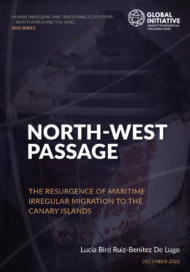Posted on 01 Apr 2017
By Rebecca Murray
Ubari, an oasis town in southern Libya’s Fezzan region, is home to members of both the Tuareg and Tubu tribes. These two tribes dominate this corner of Libya and contiguous desert regions in neighbouring countries. For over a century, relations between these tribes were peaceful, governed by an 1893 treaty known as the ‘Midi Midi’. The 2011 revolution in Libya did more than simply bring down the Qaddafi regime; it also brought down the intricately structured relationships of patronage and power that had kept the region firmly under central government control. By/In the fall of 2014, the conflicts that had raged across Libya since 2011 came to Ubari as well, shattering the old peace kept by/ the Midi Midi treaty.
A new Briefing Paper from the Security Assessment North Africa project of the Small Arms Survey explores the Ubari conflict. Written by researcher Rebecca Murray, the Paper follows the events, context, and outcomes of the 2014-2016 Ubari conflict and examines lingering threats to the stability of south-western Libya, and to the wider Sahel region. It notes that this conflict revolved around economic assets and identity rights at the local level. But—like many conflicts in Libya—the country’s rival national governments and associated international powers increasingly meddled in the fighting, causing the conflict to be viewed as a proxy war.
The peace that was eventually brokered to end the Ubari conflict is a fragile one. The town, its people, and its economy all remain heavily affected. The Briefing Paper concludes that, if the status quo persists, then the likelihood of renewed conflict is strong. Given the strong transnational family and tribal ties among both the Tuareg and the Tubu throughout the Sahel, the next conflict could easily spill beyond Ubari’s local confines and into the wider region.
The Briefing Paper’s key findings include:
- Outside interference played a significant role in prolonging the conflict in Ubari. Regional and international meddling exacerbated fault lines in the south, while locals aligned themselves with national-level factions and competing governments to receive arms, logistics, and political support.
- Unresolved issues regarding the citizenship status of the indigenous Tuareg and Tubu in southern Libya limit their employment options and curtail their freedom of movement. As a result, members of these communities are not only more likely to engage in the trafficking of migrants and contraband, but are also more vulnerable to recruitment as paid fighters by Libya’s warring parties and extremists.
- The main threats to a lasting peace in Ubari and its surroundings are the absence of a unified Libyan government and neutral security institutions; ongoing battles for national and local power and territory; and a lack of investment in infrastructure, service delivery, and the local economy.
- Should the peace agreement in Ubari collapse, repercussions are likely to be felt at the regional level. Local communities could remobilize cross-border kin as they did during the recent conflict, destabilizing neighbouring countries; at the same time, the security void could allow traffickers and extremist armed groups to thrive.



